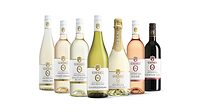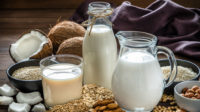A peek into pecan milk brand, PKN
CEO and founder considers pecans 'hero ingredient'

Image courtesy of PKN
The opening of thispkn.com reads “Savor the Flavor, Honor the Earth.” That is just what Laura Shenkar set out to do.
Shenkar founded PKN in 2021 with an effort to build a sustainable American brand to target the $50 billion market opportunity in plant-based milks.
Shenkar, who also serves as CEO of the Austin, Texas brand, says that, in just three years, with a lean capital model, PKN has developed award-winning products, built operations and launched products on shelves at leading premium retailers.
PKN, which is a nod to the Native American word for pecan, officially launched in retail last year.
“Milk is a staple in U.S. households, with over 90% of U.S. consumers purchasing dairy or non-dairy milk each month,” Shenkar says, citing Mintel data. “Yet, more than 36% of Americans are lactose intolerant. The plant-based milk market is projected to reach $47.5 billion by 2030, at a CAGR of 11.7% from 2023 to 2030.”
She notes that consumers are “holding back” on plant-based milks because they don’t enjoy the taste of the current options. Additionally, Shenkar shares that California almonds have supported the growth of plant-based milks, but won’t be able to accommodate the supply for almond milks as the segment grows.
Making a mark on the market
Recognizing the opportunity for flavorful plant-based beverages, Lifestock developed its first pecan milk.
“PKN has the creamy, buttery taste that reminds you of pecan pie and fall afternoons,” she says. “We are aiming to make it a true replacement for milk, not just a whitener. This winter, we launched our Barista, which provides a perfect froth for lattes and cappuccinos.”
With its nutty taste, PKN pecan milks provide ALA Omega fatty acids and minerals that support heart health and brain health, as well as protect against inflammation and diabetes, the CEO says.
“All of our pecan milks are gluten-free, non-GMO, kosher and made in the U.S.A.,” Shenkar states. “Our Original provides a true replacement for cow’s milk, with a flavor that we have developed through focus groups and sensory tests to capture the essence of pecans, with only 5 grams of unrefined can sugar and 130 calories per serving size.”
Meanwhile, Chocolate PKN provides the thick, nutty taste of chocolate with a touch of pecan. This offering contains 7 grams of added sugar, also coming in at just 130 calories in each serving. The brand’s pecan milk creamers come in Original Unsweetened and Sweet Vanilla.
“You can actually smell the pecans from the carton,” Shenkar states.
Most recently, the brand launched PKN Zero and its barista product, PKN JOY Barista.
“While cappuccinos and lattes were developed for cow’s milk, more than half the people who order these drinks today demand non-dairy alternatives,” Shenkar says. “PKN’s new barista offering is a product of more than 18 months of innovation, research and development.”
To create the barista line, the brand worked with leading baristas to develop PKN JOY Barista, a frothable pecan milk that contains a subtle hint of pecan pie.
“PKN JOY Barista is a luxurious and delicious addition to the morning coffee and has an ideal consistency for those wanting that frothy-smooth, micro-foam in lattes and cappuccinos,” Shenkar said in a statement at the time of the product’s release. “Pecan milk is a sustainable alternative milk option, and the PKN JOY Barista elevates the morning experience without harming the environment. We make our pecan milk because pecans are the only commercial tree nut indigenous to the U.S., and we believe consumers will continue to appreciate both the taste and the values behind our products.”
Shenkar also shares that the brand cares deeply about its sourcing, specifically, the farmers.
“It’s important to us to highlight the hard work our farmers do to grow the pecans that become our milk,” the founder says. “That said, our milk is made of upcycled pecan pieces, which means we as a company are more sustainable than any other brand on the market. So many farmers were wiped out by the Hurricanes Helene and Milton and will not recover. We are in touch with them and are doing everything in our power to help them and elevate their hard work, craftsmanship and dedication to the industry.”
Shenkar notes that not only are pecans sustainable, but they are also one of the highest nutritional nuts.
“The pecan is self-sustaining,” she explains. “When we hear about the almond in particular, and the amount of water needed to keep the supply there, it’s not sustainable. The pecan is native to American soil and is self-sustaining in terms of the amount of water.”
In terms of nutrition, Shenkar says that the pecan has more flavonoids than any other nut.
“Flavonoids are a growing trend for health interests due to the brain and heart support, which pecans innately provide,” she adds.
Shenkar adds that pecans can provide a foundation for better products.
“We see pecans as a hero ingredient that will enable us to build a dramatically better product and build a robust brand that can win the hearts of consumers and define a single plant-based milk as a staple in the U.S. household,” she concludes.
Looking for a reprint of this article?
From high-res PDFs to custom plaques, order your copy today!






